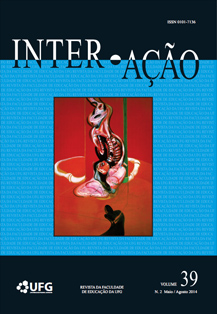EDUCAÇÃO, TRABALHO E FLEXIBILIZAÇÃO: PERSPECTIVAS NA AGENDA DAS POLÍTICAS PÚBLICAS NA SOCIEDADE DA INFORMAÇÃO
DOI:
https://doi.org/10.5216/ia.v39i2.20896Keywords:
Educação, Trabalho, Políticas Públicas.Abstract
O presente artigo busca apontar os desdobramentos do uso intensivo das novas Tecnologias da Comunicação e da Informação como instrumentos de intensificação de produtividade no modelo neoliberal sob a perspectiva das modificações no campo do trabalho, consequentemente, no perfil do trabalhador e nos caminhos para a sua formação. A elaboração de políticas públicas nesses três segmentos revela-se sob a forma de aspectos de flexibilização, com consequências importantes para a sociedade. O papel do Banco Mundial é altamente relevante dentro desse contexto, ao revelar em seus documentos diversas recomendações em campos estratégicos estruturais, principalmente dentro do domínio da educação nos países em desenvolvimento. Nesse contexto, é possível observar a forte presença de direcionadores socioeconômicos com objetivando a eficiência e a eficácia como metas gerenciais dos processos produtivos. O ensino, na modalidade a distância, quer seja pelos meios públicos ou privados, pode ocultar aspectos geradores de diferenças e desigualdades.
Downloads
Downloads
Published
How to Cite
Issue
Section
License
Inter-Ação uses the Creative Commons Attribution 4.0 License for Open Access Journals (Open Archives Initiative - OAI) as the basis for the transfer of rights. Open access means making documents available on the Internet free of charge, so that users can read, download, copy, distribute, print, search, or link to the full text of documents, process them for indexing, use them as input data for software programs, or use them for any other lawful purpose, without financial, legal, or technical barriers.
Authors publishing in this journal agree to the following conditions:
1) Authors retain copyright and grant the journal the right of first publication, with the work simultaneously licensed under the Creative Commons Attribution License, which permits redistribution of the work with attribution and first publication in this journal.
2) Authors are permitted to enter into additional, separate agreements for non-exclusive distribution of the version of the work published in this journal (e.g., for publication in an institutional repository or as a book chapter), with attribution and first publication in this journal.
3) Authors are permitted and encouraged to publish and distribute their work online (e.g. in institutional repositories or on their home page) at any time before or during the editorial process, as this may generate productive changes as well as increase the impact and citation of the published work.















